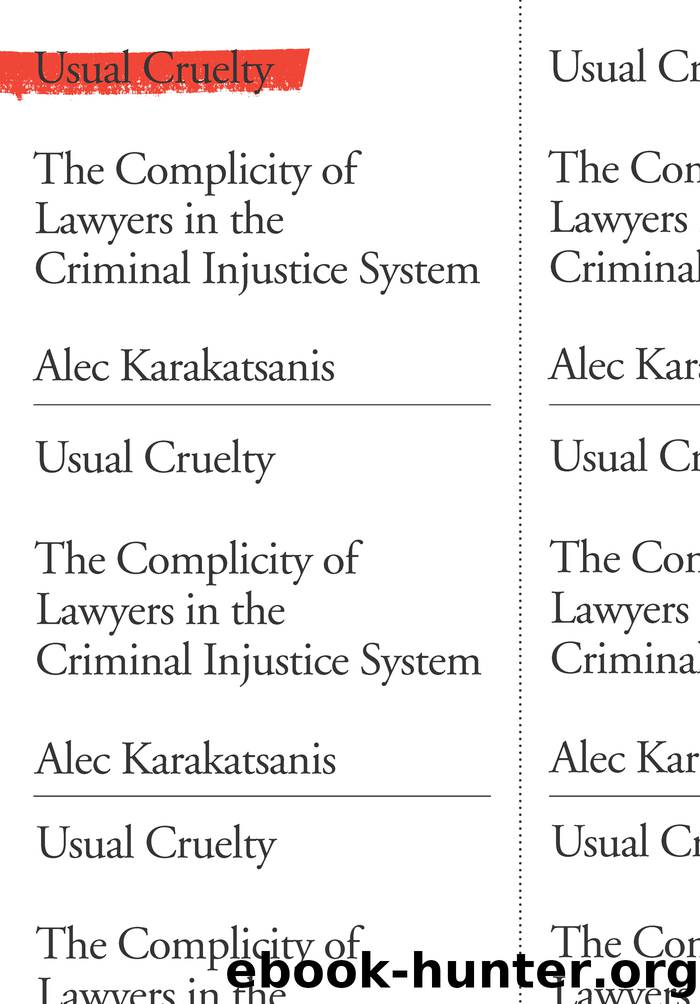Usual Cruelty by Alec Karakatsanis

Author:Alec Karakatsanis
Language: eng
Format: epub
Publisher: The New Press
Published: 2019-03-10T16:00:00+00:00
XVII
Most law review articles begin with a roadmap. Most novels do not. Lawyers are obsessed with the reader getting one meaning from a text. This is perhaps the law’s greatest strength and its greatest weakness. For lawyers, arguments progress neatly from one point to another, and assumptions and logical connections can be isolated and evaluated.
Decision-making through rigorous reasoning is surely an underutilized process in other areas of our lives. (We often fail to test each of our personal beliefs and decisions for logical consistency with our values or to make sure that each of our actions is based on deep thought and sound evidence. We often act based on gut feelings or emotions, habit, unreflected assumptions, or cultural norms.) But despite the benefits of rigorous reasoning, a single-minded focus on this reasoning process can be a poor way of introducing and developing new legal paradigms and giving voice to new or different experiences. In the process of isolating and communicating a single meaning, a subset of potential meanings is slowly and systematically suffocated. What starts as a few errant snowflakes becomes an avalanche of forgotten human experiences on the mountain of legal “scholarship” and judicial opinions that define the shared legal universe.
Legal decisions are made and legal commentary is written on the level of shared cultural consciousness. The belief among the faithful seems to be that this shared consciousness can be achieved only through rational argument (or, more precisely, what commonly passes for rational argument in legal discourse). Legal scholarship often appears intentionally to rid itself of emotion and narrative. It is true that a few pages in a judicial opinion or in a law journal is an imperfect medium for communicating the complex workings of the human mind; our thoughts are overwhelmed with panic, insecurity, joy, fear, frustration, sorrow, exhilaration, and other sensations that can only be experienced and can never quite be described.
But these sensations can be felt, and legal writing could help us feel them. In particular, stories can help us make these emotional connections—to come to our own understanding about a person or an issue in a way that reasoned argument may not on its own. That is why, in our personal lives, we rely heavily on feelings, relationships, emotional bonds, telling each other stories, and other experiences to inform our sense of how our lives connect to others.
Shared consciousness can and sometimes should be much more than the product of rational argument. We can share in irrationality—in things that we cannot easily derive from or explain with reasons. And we often do; when we meet eyes with one we love or when we look at a picture of an anonymous student standing in front of a tank.
It is this irrationality that narrative helps to capture. It is this irrationality that helps define our humanity. Stories help us create emotional bonds, and they help us sense how others are experiencing the world. The emotions and insights gained from stories are thus vital for developing the kind
Download
This site does not store any files on its server. We only index and link to content provided by other sites. Please contact the content providers to delete copyright contents if any and email us, we'll remove relevant links or contents immediately.
The Secret History by Donna Tartt(19083)
The Social Justice Warrior Handbook by Lisa De Pasquale(12190)
Thirteen Reasons Why by Jay Asher(8907)
This Is How You Lose Her by Junot Diaz(6885)
Weapons of Math Destruction by Cathy O'Neil(6279)
Zero to One by Peter Thiel(5798)
Beartown by Fredrik Backman(5751)
The Myth of the Strong Leader by Archie Brown(5507)
The Fire Next Time by James Baldwin(5441)
How Democracies Die by Steven Levitsky & Daniel Ziblatt(5218)
Promise Me, Dad by Joe Biden(5153)
Stone's Rules by Roger Stone(5087)
A Higher Loyalty: Truth, Lies, and Leadership by James Comey(4959)
100 Deadly Skills by Clint Emerson(4924)
Rise and Kill First by Ronen Bergman(4788)
Secrecy World by Jake Bernstein(4751)
The David Icke Guide to the Global Conspiracy (and how to end it) by David Icke(4717)
The Farm by Tom Rob Smith(4506)
The Doomsday Machine by Daniel Ellsberg(4489)
